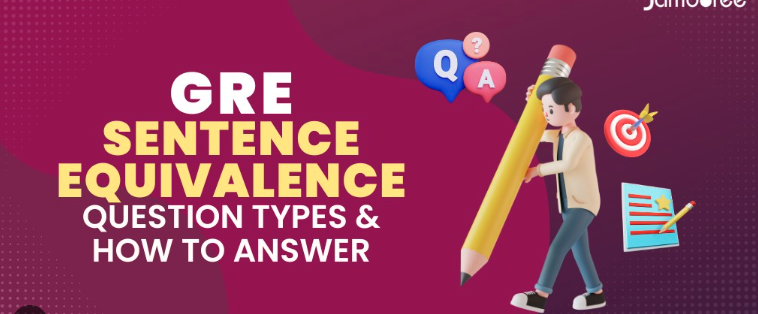If you're preparing for the GRE, you’ve likely come across Sentence Equivalence questions, and maybe you’ve found them to be a bit tricky. Don’t worry you're not alone. At TakeMyGREExam.com, we believe with the right strategy, these questions can become your best friend on test day. Let's break down the best way to tackle GRE Sentence Equivalence questions so you can approach them with confidence.
What Are GRE Sentence Equivalence Questions?
Before diving into strategies, let’s first understand what Sentence Equivalence questions are all about. In this section of the GRE verbal reasoning test, you’ll be presented with a sentence that has one blank. Below the sentence, there will be six answer choices. Your task is to choose two words that, when inserted into the sentence, create a sentence with the same meaning. The key here is that both words must fit the meaning of the sentence in the same way, creating a sentence that "feels" equivalent.
These questions are designed to test your ability to recognize subtle differences in meaning and choose the most accurate word pair based on context. While vocabulary plays a role, the context and structure of the sentence will guide your choices.
Strategies for Answering GRE Sentence Equivalence Questions
-
Read the Entire Sentence First
The first step is simple: read the entire sentence carefully before you even look at the answer choices. Get a sense of what the sentence is about and try to fill in the blank with your own word or phrase. This will give you a mental framework to compare the answer choices against. -
Focus on Context and Meaning
Context is everything when answering Sentence Equivalence questions. The word(s) you choose need to fit seamlessly into the sentence, maintaining its overall meaning and tone. Pay close attention to any clues in the sentence such as conjunctions, adjectives, or verbs that provide context. Words like "but," "although," "because," and "therefore" are all signals that can help you understand how the blank fits into the broader meaning.For example, if the sentence hints at a negative situation or contradiction, you're likely looking for a pair of words with a similarly negative or contrasting meaning. On the other hand, if the sentence has a positive tone, the correct choices will likely be words that fit into a positive context.
-
Eliminate Clearly Incorrect Choices
Once you've identified the general meaning of the sentence, start eliminating answer choices that clearly don’t fit. If a word doesn’t make sense in the context of the sentence, it’s not the right answer. For example, if the sentence is about something being "harsh" or "unpleasant," but an answer choice suggests something "pleasant," you can rule it out.Also, remember that Sentence Equivalence questions require two answers that create equivalent sentences. If you find an answer choice that seems to fit, but doesn’t create the same meaning as another word, eliminate it.
-
Look for Pairs of Words with Similar Meanings
This is a unique feature of GRE Sentence Equivalence questions: you need to find two words that produce the same meaning in the context of the sentence. Often, the correct answers are synonyms or words with closely related meanings. If two answer choices seem to mean the same thing, and both fit well in the sentence, it’s likely that they’re the correct answers. -
Trust Your First Instincts
Sometimes, your first instinct is the right one. After reading the sentence and thinking about the options, go with the words that feel most natural in the sentence. Don’t overthink it if you’ve carefully considered the context and eliminated wrong choices, you’re probably on the right track. -
Practice Makes Perfect
The more you practice GRE Sentence Equivalence questions, the more intuitive they will become. At TakeMyGREExam.com, we provide tons of practice questions and explanations to help you sharpen your skills. Practice regularly, and you’ll start recognizing patterns and becoming more confident in your choices.
Common Mistakes to Avoid
-
Choosing Words Without Considering the Entire Sentence: It’s easy to get focused on a single word and ignore the overall context of the sentence. Always consider the sentence as a whole before choosing your answer.
-
Focusing Too Much on Word Definitions: GRE Sentence Equivalence questions are about context, not just memorizing word definitions. Words may have multiple meanings, and the key is understanding how they fit into the sentence.
-
Overcomplicating Your Choice: Sometimes, students get caught up in overthinking the answer choices. If two options clearly make the sentence equivalent, trust that you’ve found the right pair.
-
Not Practicing Enough: Like any skill, practice is essential for mastering Sentence Equivalence questions. Don’t underestimate the power of repetition.
How Can TakeMyGREExam.com Help You?
At TakeMyGREExam.com, we’re dedicated to helping students like you succeed on the GRE. Our platform provides a variety of practice tests, detailed answer explanations, and strategies specifically designed to tackle each section of the GRE. When it comes to Sentence Equivalence questions, our resources will help you:
-
Build a Strong Vocabulary: Improve your vocabulary and understanding of word meanings in context with our comprehensive study materials.
-
Gain Confidence: With regular practice, you’ll approach Sentence Equivalence questions with ease and confidence.
-
Get Expert Guidance: Our team of experts is here to offer tips, strategies, and feedback to ensure you’re on the right track.
Frequently Asked Questions (FAQs)
Q1: How can I improve my vocabulary for GRE Sentence Equivalence?
A1: To improve your vocabulary, focus on reading diverse materials like articles, books, and essays. Pay attention to words in context, and use flashcards or vocabulary apps to memorize key words. Remember, it’s not just about memorizing words it’s about understanding how they work in different contexts.
Q2: How do I choose the right word pair for GRE Sentence Equivalence?
A2: Look for words that have similar meanings and fit seamlessly into the context of the sentence. Both words in the pair should create an equivalent meaning and tone in the sentence. Eliminate choices that don’t fit the overall context.
Q3: Should I spend a lot of time on each Sentence Equivalence question?
A3: While it's important to read the sentence carefully, don’t spend too much time on each question. Practice will help you get faster at recognizing the correct word pairs. Aim to strike a balance between speed and accuracy.
Q4: Are GRE Sentence Equivalence questions tricky?
A4: They can seem tricky at first, but with practice and the right strategy, they’ll become more manageable. Focus on understanding the context and using the process of elimination to narrow down your choices.
Q5: Can I get access to practice Sentence Equivalence questions?
A5: Yes. TakeMyGREExam.com offers plenty of practice questions to help you get ready for the GRE. We provide detailed explanations and strategies to help you improve your skills and score higher on test day.
Ready to Master GRE Sentence Equivalence?
Now that you’ve got the tools and strategies to answer GRE Sentence Equivalence questions confidently, it’s time to put them to the test. Explore the resources at TakeMyGREExam.com, and take your preparation to the next level. With practice, the right strategy, and our expert guidance, you'll be on your way to acing the GRE and achieving your goals. Happy studying.


